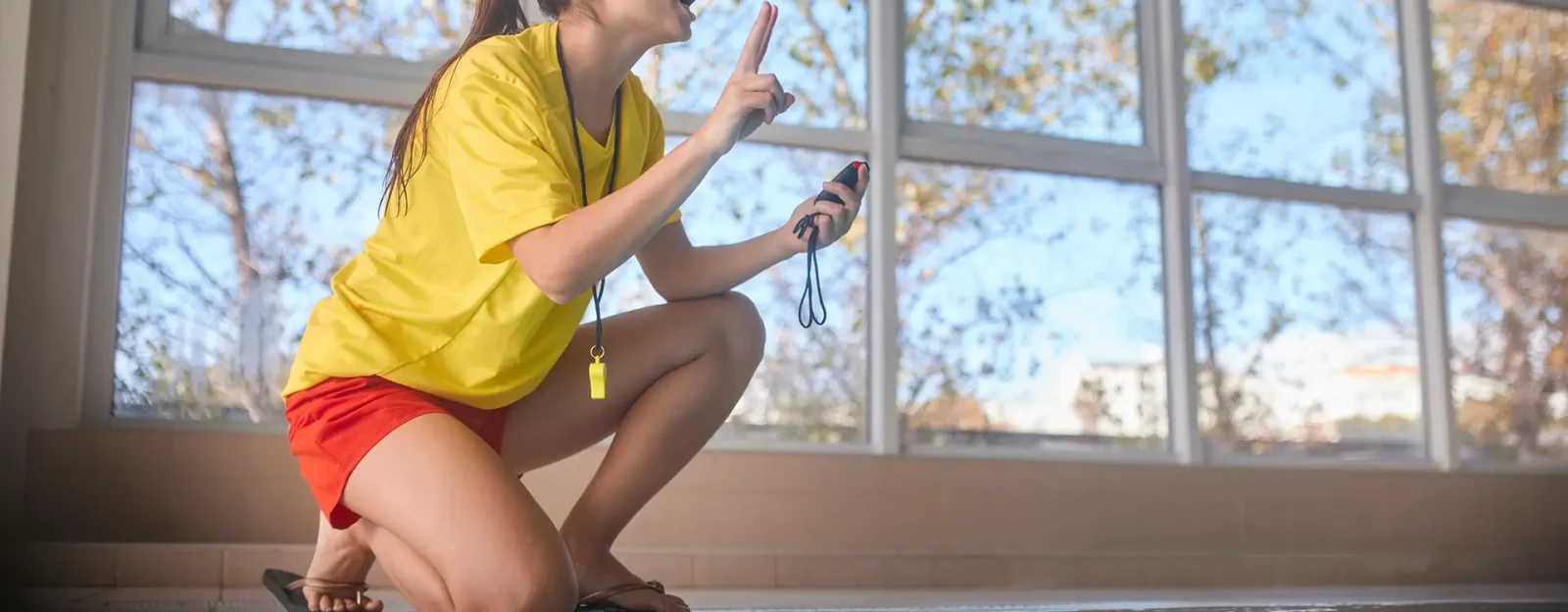Lifeguard
Also known as; Pool lifeguard
The role of the lifeguard is to facilitate a safe aquatic environment to enable users to participate in a range of aquatic activities.
What could I earn as a Lifeguard?
Your earnings will depend on the hours you work, your location, level of experience and whether you are employed or self-employed. To give you an idea, the data presented reflects the earnings listed in job advertisements across the UK from January to December 2024, as gathered via Lightcast (March 2025). Average annual earnings reflect full-time roles (>32hours/week), however average hourly earnings are a reflection of data collected from full-time, part-time and flexible hours vacancies.
Average UK earnings
Avg. annual earnings
Avg. hourly earnings
total job postings
- Weekdays
- Evenings
- Weekends
- Bank Holidays
63% of lifeguard job adverts are hiring for full-time positions.

What does a Lifeguard do?
Lifeguards ensure that the aquatic environment is safe so that participants can take part in a range of aquatic activities. They work in a range of different environments including swimming pools, inland water and our amazing beaches.
Lifeguards work as part of a team and are responsible for the safe supervision and rescue of users within their care, as well as for intervening in and preventing accidents and dangerous situations. As a part of their role, lifeguards also deliver high levels of customer care and are public facing.
Skills and behaviours
The following common or transferable skills are most frequently asked for by employers in lifeguard job adverts across the UK:
| Skills and behaviours | % prevalence in job ads |
|---|---|
| Customer service | 33% |
| Communication | 27% |
| Cleanliness | 18% |
| Enthusiasm | 17% |
| Management | 14% |
| Operations | 14% |
| Teaching | 13% |
| Swimming | 13% |
| Professionalism | 12% |
| Detail orientated | 11% |
To find out more about the minimum knowledge, skills and behaviours an individual must understand and demonstrate to become a lifeguard, you can visit our occupational professional standards library.
How to become a Lifeguard
There are several ways you can become qualified as a lifeguard. Look at the options below to explore what option works best for you.
Complete a qualification with a training provider
To become a lifeguard, you need to complete a qualification in pool lifeguarding such as the
- Level 2 Award in Pool Lifeguarding
- Level 3 Award in National Pool Lifeguarding
You can browse all of our endorsed lifeguard qualifications in our Endorsed Training Directory.
Course entry requirements, delivery and cost
Lifeguard courses are delivered in person or via a hybrid delivery format (online and in person) and have entry requirements including being able to:
- jump or dive into deep water
- swim 50 metres in less than 60 seconds
- swim 100 metres continuously on front and back in deep water
- tread water for 30 seconds
- surface dive to the floor of the pool
- climb out of the pool unaided without using ladders or steps.
The total course cost, study time and guided learning hours will vary depending on the delivery format, qualification and training provider you choose.
College or university
Some colleges and universities have embedded lifeguarding qualifications into their learning programmes.
In our Endorsed Training Directory, you can check what courses our CIMSPA endorsed colleges and universities offer as well as course entry requirements, a summary of course content/material and more information on how to apply.
Apprenticeship
The Leisure Team Member apprenticeship allows you to become qualified as a pool lifeguard. This apprenticeship also offers options to become qualified as a gym instructor, recreation assistant, swimming teacher and first aider alongside your lifeguard qualification.
You can find out more about completing a Leisure Team Member apprenticeship in via The Institute for Apprenticeships and Technical Education (IfATE) website.
Professional Standards
CIMSPA is the guardian of a single professional and apprenticeship standards framework for the sport and physical activity sector – outlining the minimum knowledge, skills and behaviours an individual must understand and demonstrate for every occupation and job role in the sector.
This standards framework is driving the development of quality education products for our workforce and supporting employers in assessing which job roles an individual is qualified for.
Lifeguard Courses and qualifications
Occupations and specialisms
CPD points
value
Prerequisites
Delivery format(s)
Occupations and specialisms
CPD points
value
Prerequisites
Occupations and specialisms
CPD points
value
This course is provided by a quality assured three star enhancing partner
Prerequisites
Occupations and specialisms
CPD points
value
This course is provided by a quality assured three star enhancing partner
What's the best role for you?
Check out the Training Accademy
Career paths and progression
Career pathways
Side Steps
Next Steps
Career progression
As well as exploring new career pathways, as a lifeguard, you can also choose to progress your career by completing further training or continued professional development (CPD) in your role.
Continuing Professional Development
Occupations and specialisms
CPD points
value
Prerequisites
Delivery format(s)
Occupations and specialisms
CPD points
value
Prerequisites
Occupations and specialisms
CPD points
value
This course is provided by a quality assured three star enhancing partner
Prerequisites
Occupations and specialisms
CPD points
value
This course is provided by a quality assured three star enhancing partner
Find a job as a Lifeguard
The content of the job posts displayed on the CIMSPA jobs board are pulled in through feeds from websites which are not under the control of CIMSPA.
CIMSPA will not be liable for any false, inaccurate, inappropriate or incomplete information presented on the jobs board.